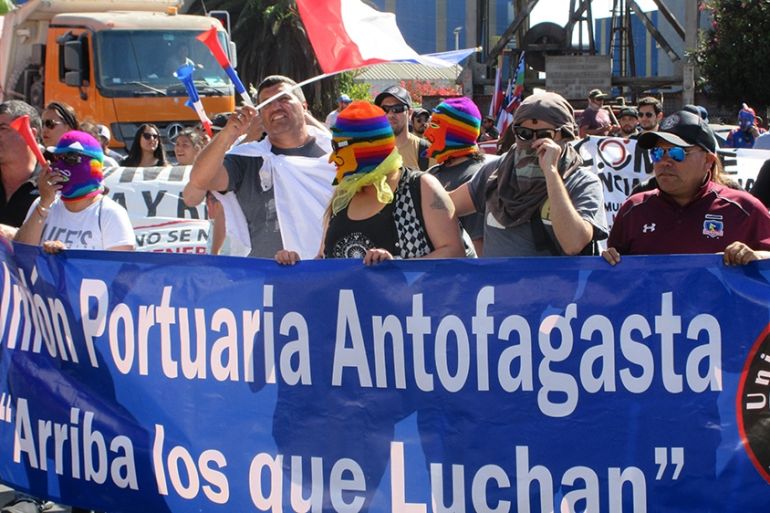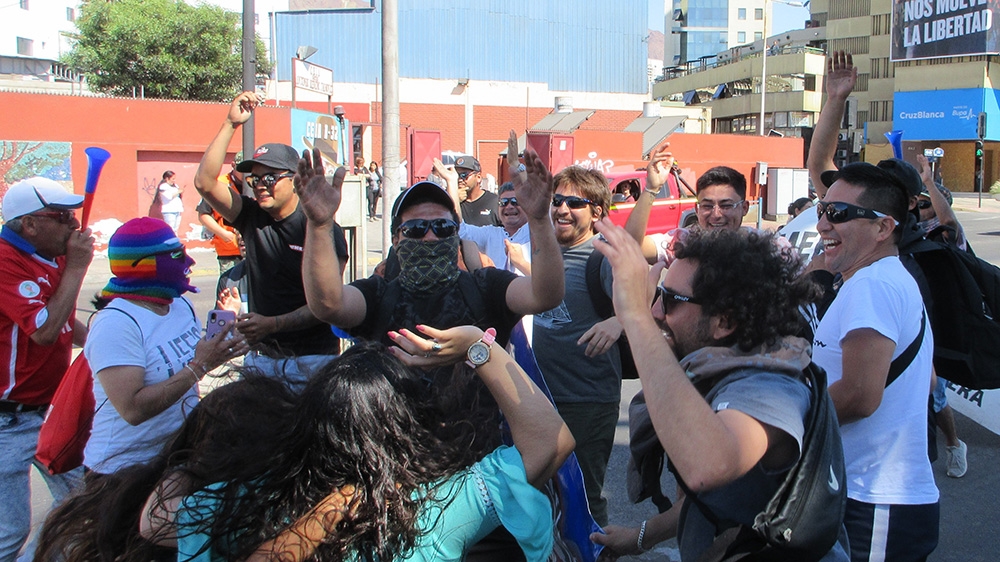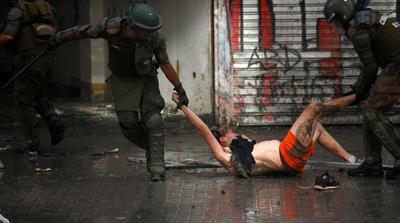Dockworkers in Chile paralyse ports ahead of broader strike
The strike affects shipments of copper, Chile’s top export, and other goods as protests over high inequality continue.

Antofagasta, Chile – Dockworkers are on strike in Chile as nationwide mass protests against inequality and social conditions enter their sixth week.
Members of the Chilean Dockworkers Union began a 48-hour strike on Monday morning, paralysing operations at 24 ports up and down the country’s 6,435km (4,000-mile) Pacific coastline. Education, health, transport, public sector and other labour unions are scheduled to strike on Tuesday.
Keep reading
list of 3 itemsChile police continue to use pellet rounds despite suspension
How Chileans are reclaiming public areas, rebuilding amid unrest
“We’re on strike because of the injustice in the country,” said Walter Inestroza, a spokesperson for the local branch of the dockworkers union in Antofagasta, a city 1,400km (860 miles) north of Santiago.
“And we are here because of the repression by state forces against workers,” he told Al Jazeera.
After Chile’s return to democracy following a 1973-1990 military dictatorship, the South American country developed a shining reputation. It has often been considered a beacon of stability and even prosperity in the region: Chile is the top-ranking Latin American country in the United Nations Human Development Index. And yet income inequality in Chile is among the highest of member countries of the Organisation for Economic Co-operation and Development (OECD).
“There is so much inequality,” Alberto Mamquepan, an indigenous Mapuche dockworker in Antofagasta, told Al Jazeera. “The system is rotten.”
Compared to most jobs in the city, dockworkers make good money, but dockworkers also have parents and grandparents with miserable pensions, said Mamquepan. The protests cannot be pinned down to any single issue, he said.
“It is … everything. It is not one single thing. That is why things exploded,” he said. “This affects us all.”
The power of dockworkers
Antofagasta is a mining region. Its port is one of two key facilities used to ship copper, one of Chile’s top exports. In Chile, mining, manufactured goods and agriculture are the economy’s mainstays. And the international trade of much of these goods relies on ports.
In its strike declaration on Friday, the national dockworkers union emphasised its condemnation of crackdowns on protests by security forces.

“Human rights are non-negotiable,” stated the union. “The reasons for a new general strike are unchanged: rejection and punishment of a criminal government that has responded to protesters with brutal repression.”
Prosecutors are investigating 26 deaths in the context of the crisis, including five killings attributed to military and police forces by officials. Thousands have been detained and injured, according to the National Human Rights Institute, a state body.
Amnesty International, a UK-based human rights group, published a report last week alleging security forces have deliberately injured protesters and engaged in indiscriminate attacks. Police projectiles have reportedly injured the eyes of more than 280 people. The government, military and police rejected the group’s findings and strongly denied the allegations that security forces have engaged in intentional harm.
But Chilean President Sebastian Pinera acknowledged earlier this month that there had been abuses and instances when human rights were not respected.
“In some cases, protocols were not respected. There was excessive use of force. Abuses or crimes were committed,” he said, adding that the government was committed to carrying out investigations and delivering justice.
Government response
Government officials estimate arson, looting and property destruction over the past five weeks have caused $3bn in property damage.
Pinera announced on Sunday that his government would present a bill that would permit the deployment of the Chilean Armed Forces to safeguard key infrastructure and police stations without decreeing a state of emergency or other kind of so-called “state of exception”. Such a decree would otherwise suspend constitutional rights and freedoms and hand control of public order to the military.
The proposal is at odds with the constitution, which states that only the two police forces – Carabineros and investigators – have a mandate to maintain public order.

Pinera decreed a state of emergency last month in response to mass protests and property destruction, and most of the killings took place during that time.
The new proposal to deploy the military is designed to provoke fear, said Patricia Romo, president of the Antofagasta chapter of the national teachers association.
“The militarisation was fierce during the state of exception,” she told Al Jazeera while preparing to march on Monday alongside the dockworkers. “It terrorised people.”
At a national level, the teachers association will join health, transport and other sector union federations in a two-day strike beginning on Tuesday.
“We are working toward an indefinite national work stoppage to demand a halt to human rights violations,” said Romo.